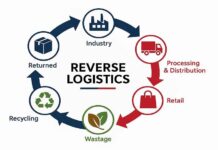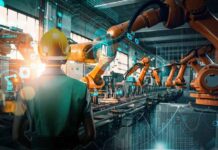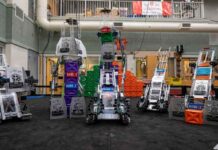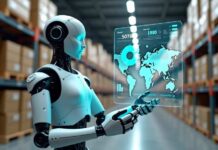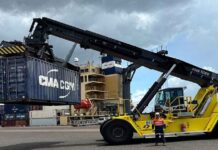The Future of Automation: Balancing Technology with Human Touch in the Supply Chain
The future of automation is dynamic, exciting, and already transforming industries. In particular, the supply chain and logistics sectors are experiencing significant advancements as automation helps mitigate disruptions and increase resilience across the courier industry. With each passing year, automation gains momentum, addressing some of the most pressing challenges businesses face while enabling more informed decisions to optimize efficiency.
However, as we embrace this new era of automation, it’s crucial to maintain the human element, ensuring that the balance between technology and human intuition is preserved. This approach not only keeps operations efficient but also ensures that they remain ethical, transparent, and responsive to customer needs.
Ushering in the Future of Automation
The future of automation in supply chain and logistics is already improving efficiency on multiple levels. Automation frees up employees’ time by handling demand-driven tasks and increasingly complex operations. Advanced technologies like artificial intelligence (AI) are at the forefront of this transformation. AI-powered automation enables faster and smarter decision-making, allowing for the automation of tasks that were previously manual and labor-intensive.
One of the most significant advantages of AI is its ability to analyze vast amounts of data quickly and efficiently. This capability allows businesses to gain actionable insights into potential problems before they arise. For example, automation systems can predict delivery disruptions, giving companies the ability to take proactive measures and prevent these issues from escalating. This predictive element is critical to the future of automation as it allows businesses to anticipate challenges and adjust operations accordingly.
Automation also improves supply chain visibility. With the right systems in place, businesses can track the movement of goods from start to finish, ensuring real-time updates on inventory and deliveries. This level of visibility is increasingly becoming a standard expectation, as consumers today are accustomed to tracking their online deliveries from point A to point B. Companies should expect to see similar transparency throughout their supply chains, allowing for quick responses to potential disruptions.
Automation Filling in the Gaps
In the warehouse sector, automation plays a vital role in inventory management. Automated systems ensure that warehouses maintain optimal stock levels by triggering replenishment orders when inventory falls below a set threshold. This process minimizes the risk of stockouts and ensures that businesses can meet demand consistently. By integrating AI into these systems, businesses can even forecast demand ahead of time, allowing for better preparation, especially during peak seasons.
For example, during the summer months, many consumers start planning for the holiday season, leading to an increase in demand for certain products. Automated systems help warehouses manage this surge by adjusting stock levels and ensuring that products are available when needed. This capability is essential for maintaining supply chain resilience and keeping customers satisfied.
Moreover, warehouse automation technologies help reduce the physical strain on workers by speeding up routine tasks. These technologies reshape how customer service is delivered by allowing employees to focus on more value-driven activities rather than repetitive manual labor. The future of automation in warehouses is about creating a seamless, efficient environment where employees can operate alongside technology to maximize productivity.
The Human Touch in a High-Tech Future
While automation offers significant advantages, the human touch remains essential in the supply chain, particularly in the courier industry. Automation may take over routine, time-consuming tasks, but human oversight and intervention are still critical to managing and maintaining these systems. As the industry evolves, the demand for experienced individuals who can manage these automated systems will only increase.
Human expertise is necessary to ensure that automation runs smoothly, remains ethical, and meets compliance standards. For example, automation may not always be able to handle situations that require emotional intelligence, such as dealing with an upset customer. In these cases, human judgment and empathy are invaluable in resolving issues that go beyond the scope of automation. This balance between technology and human intervention ensures that customer relationships remain strong and that trust is maintained.
Building and maintaining relationships with customers and suppliers is another area where humans excel. Automation can handle data processing and logistics, but it cannot replicate the emotional intelligence needed to foster collaboration and trust. The future of automation must account for this, ensuring that human workers continue to play a critical role in creating strong business relationships.
Moreover, humans play an important role in ensuring that automation remains ethical. Automated systems can make decisions based on data, but they lack the moral and ethical framework that humans bring to the table. Human oversight is necessary to hold these systems accountable and to ensure that decisions made by machines align with broader ethical standards.
Automation as the Future of Supply Chain Resilience
As businesses continue to adapt to the future of automation, it is becoming clear that technology alone is not enough to sustain long-term success. Automation enhances efficiency, reduces costs, and improves accuracy, but the human element is what ensures that these systems function within ethical guidelines and remain responsive to unforeseen challenges.
In the future of automation, AI-powered systems will play a crucial role in optimizing supply chain operations, from predicting disruptions to managing inventory. However, the human workforce will continue to have a fundamental role, particularly in overseeing these systems and handling situations that require a personal touch.
Companies that integrate automation effectively while maintaining a human-centric approach will be better positioned to thrive in an increasingly automated world. By balancing the efficiency of technology with the intuition and empathy of human workers, businesses can create a harmonious environment where both elements complement each other.
The Future of Automation is a Collaborative Effort
The future of automation is undoubtedly transforming the supply chain and logistics sectors, offering significant advantages in terms of efficiency, cost savings, and resilience. AI-powered automation systems can analyze data, predict disruptions, and manage inventory, all while freeing up employees to focus on higher-level tasks. This shift is making the supply chain more resilient and adaptable in the face of modern challenges.
However, as we embrace this future, we must not forget the importance of the human touch. While automation is essential for handling repetitive and data-driven tasks, human workers bring the empathy, intuition, and ethical oversight that machines cannot replicate. The future of automation lies in creating a collaborative environment where technology and human expertise work together to optimize operations, enhance customer relationships, and ensure ethical practices.
In conclusion, the future of automation in the supply chain is about more than just machines taking over tasks. It’s about blending advanced technology with human capabilities to create a more resilient, efficient, and ethical supply chain. As businesses continue to invest in automation, they must remember the value of the human touch and ensure that technology enhances rather than replaces the workforce.






